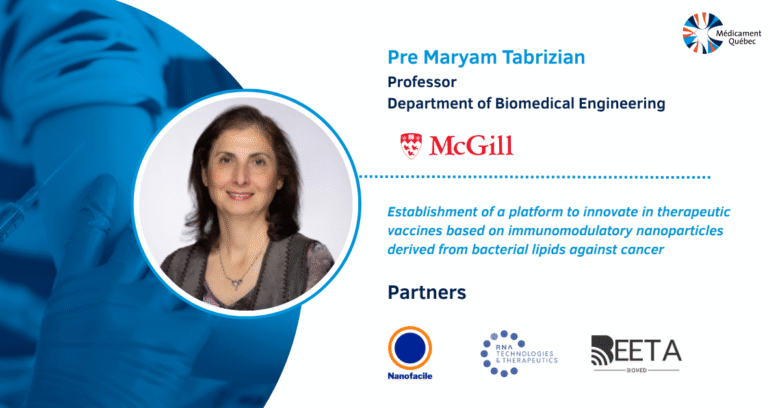Establishing a platform to innovate therapeutic vaccines using immunomodulatory nanoparticles
October 21, 2025 – Funded activities
As part of its Vaccine Technology Innovations program, Médicament Québec is supporting six collaborative research initiatives bringing together academia and industry partners. Discover Dr. Tabrizian’s project focused on developing a platform to innovate therapeutic vaccines .
Metastatic cancer, responsible for nearly 90% of cancer-related deaths worldwide, remains a major medical challenge. Its complexity stems from the genetic heterogeneity of tumors, the ability of cancer cells to evade the immune system, and their high adaptability. Conventional treatments such as surgery, radiotherapy, or chemotherapy offer limited solutions against metastatic mechanisms, often leading to recurrence and poor prognosis.
In light of these limitations, therapeutic vaccines are emerging as a promising approach by mobilizing the immune system to directly target cancer cells. However, several obstacles remain, including the identification of relevant tumor antigens and the development of effective delivery systems.
Prof. Tabrizian’s activity aims to develop an innovative platform using hybrid lipid nanoparticles (hLNPs) derived from bacteria to design new RNA-based cancer vaccines. These hLNPs combine bacterial lipids with synthetic lipids, providing greater biocompatibility, stability, and RNA delivery efficiency than conventional nanoparticles. They can also be produced at scale using genetically engineered bacteria, thereby reducing manufacturing costs and enabling high-throughput screening.
To achieve this, the activity will integrate multiple platforms for the design, characterization, evaluation, and validation of hLNPs, including:
- AI- and machine learning–assisted design tools to optimize formulations, identify trends in data, reduce trial-and-error processes, and predict hLNP performance.
- In vitro, in vivo, and organ-on-chip analyses to validate stability, efficacy, and immune system activation.
- High-throughput screening to accelerate identification of the most promising formulations.
- Bioinformatics tools coupled with machine learning to refine candidate selection.
This integrated multi-platform approach will accelerate the identification of the most promising RNA vaccines and facilitate their progression toward clinical trials.
This project brings together a large multidisciplinary team:
Academic researchers:
- Maryam Tabrizian – Full Professor, Biomedical Engineering, McGill University
- Julia Valdemarin Burnier – Assistant Professor, McGill University
- Guojun Chen – Assistant Professor, Biomedical Engineering, McGill University
- Thomas Duchaine – Full Professor, Biochemistry, Goodman Cancer Institute, McGill University, and Scientific Director of the mRNA Therapeutics Platform
- Paul François – Full Professor, Biochemistry and Molecular Medicine, Université de Montréal, IVADO & Mila
- Marc Lavertu – Associate Professor, Chemical Engineering, Polytechnique Montréal
- Sara Mahshid – Assistant Professor, Biomedical Engineering, McGill University
- Ian Watson – Associate Professor, Biochemistry, McGill University
Industry partners:
- Nanofacile, a company specializing in nanofabrication and development of innovative materials
- RNA Technologies & Therapeutics (RNA T&T), an expert company in the design and optimization of RNA-based technologies
- Beeta Biomed, a company focused on developing biotechnology solutions for health applications
By combining cutting-edge approaches in bioengineering, artificial intelligence, and immunology, this activity has the potential to transform the research and development of therapeutic cancer vaccines and position Québec among the world leaders in this emerging field.
This activity is supported by the Government of Québec through Médicament Québec, which is investing $0.8M. This contribution is supplemented by $0.4M from industrial partners, for a total investment of $1.2M.


Comments are closed.